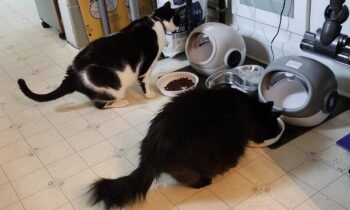
We’ve discussed preparing for your pet’s old age financially, but money isn’t everything. Even before you pick a pet, you can make choices that will ensure an easier life for both of you, especially as your pet ages. First and foremost, look ahead. Don’t fall in love with the wrong choice!
Here are some subjects to consider before you pick a pet.
Longevity
- How long will this pet live? (Don’t guess! Do the research.)
- What do I have planned for my life in the years my pet will be elderly?
- Will I be around, and will I be able to care for my pet in his senior years?
When I got my first ferret, I read that the average lifespan of a ferret is eight years. “Okay,” I said to myself, “I don’t have anything planned for the next eight years. I guess I’ll get one.” One became two (because ferrets are like potato chips), then three, then five. Then my life changed—surprise!—and I wanted to travel. Do you know how difficult it is to find a ferret sitter? I finally did, though—a great pet sitter who agreed to learn what was necessary about ferrets. It all worked out fine. Then my perfect ferret sitter had a baby and . . . well, let’s just say I won’t be traveling for a while.
I also didn’t understand that the average lifespan of a ferret would probably include some months or years at the end of life during which the ferret might be very ill. Unfortunately, that was something I had to learn the hard way, when my ferrets starting having physical problems. There are ferret owners around the world who spend enormous amounts of money on surgery, implants, and expensive medications to keep their ferrets alive and somewhat healthy. I guess I was lucky that none of my ferrets required my entire bank account. I simply had no idea how many health issues might be involved.
For a pet, a ferret has a very short life span. Imagine instead that you are entranced with the idea of owning a bird or a tortoise. What a contrast! People planning to add a bird or tortoise to their family have a whole different set of circumstances to consider, including one that is supremely important: when you adopt an animal that will probably live longer than you will, provisions must be made, usually legally, for what will happen to that animal when you are not alive any more. Yes, people do bequeath long-living birds and tortoises to friends or family members in their wills—we hope with the heirs’ approval!

Size
- How big will this pet be when it’s a full-grown adult?
- Will I always be able to deal with this pet physically?
I knew a couple who, in their forties, had two big dogs and one medium-sized dog. During the time those dogs lived with them, both humans developed chronic physical problems of their own, including bad backs and shoulders. As the big dogs aged, physically dealing with their needs was often difficult—sometimes painful—for their human caregivers. The couple got a dog stretcher which, they figured, might aid them in carrying a dog that could not walk. They used the stretcher once.
Eventually, both big dogs and the medium-sized dog died. The couple talked frequently about what would be their “next” dog. They acknowledged their own physical deterioration and agreed: the next dog would be one they could carry easily, a small to medium size. That made perfect sense.
Unfortunately, the desire for another dog overcame their wise planning. One day when one of the couple was out of town dealing with a family health emergency, the other member of the couple stopped by a local pet chain store, where a local rescue was exhibiting several dogs up for adoption. It was love at first sight, or whatever passes for that between human and animal. Within days, the couple had a new dog: a seventy-five-pound retired racing greyhound, chosen by one of them, unseen by the other. What had happened to their agreement about the “next” dog?
Now the couple is in their sixties, with a dog that neither of them can lift.
They provided a good home for a good dog, that’s true, but this impulsive choice is surely going to come back to bite them (not literally) as their huge dog ages and they do, too. I fault the rescue for adopting to them, especially with only one half of the couple making the choice. I fault the couple for being unrealistic about their choice and, even when they realized in the first few days the dog was with them that they had not considered all the drawbacks, for not returning the dog to the rescue.
Strength
- Is this animal ever likely to be so strong I cannot handle it?
The physical force of an animal may not matter much if you are considering adopting a ferret, for instance. Two pounds of strong and healthy ferret is likely to be relatively easy to care for physically, even if the ferret is not totally cooperative. Seventy-five pounds of unmannered and untrained greyhound, however, may be a different story! Dog trainers see so many older owners who’ve adopted large-breed puppies, then realized as the puppy gained size and strength that they were simply not physically able to care for the dog—he couldn’t be held, he couldn’t be walked—and that his boisterous normal behavior was endangering their own physical health! The last thing any pet owner needs is a pet-related injury.
- Older owners might consider adopting older pets.
Older pets have reached their full size. Their temperament is observable. Their energy is at a lower level than it was in their youth. They will be much more likely to enjoy a more sedentary lifestyle. They still need care and consideration, of course, but they are much less likely to endanger their owners’ health with boisterous, unruly behavior. True, they will have aging issues, too, but many programs are available through animal shelters that offer not only reduced-fee or no-fee adoptions for seniors, but also backup and support for elderly animals’ heath care and expenses.
One other thought to consider if you are hoping to adopt a “family” pet—your pet will still be there when your children move away. You will never be an empty-nester as long as you still have a pet. That can be a good thing unless you’ve planned to be around home much less once the kids have left. Did you hope to travel? Did you hope to downsize, maybe move to a smaller domicile? Just remember that, with the children gone, you no longer have family backup for your pet care duties. That means that all the walks, all the meals, all the grooming . . . it’s all on you. Will that be a good thing or a bad thing?
The time to decide is before you adopt the pet!



